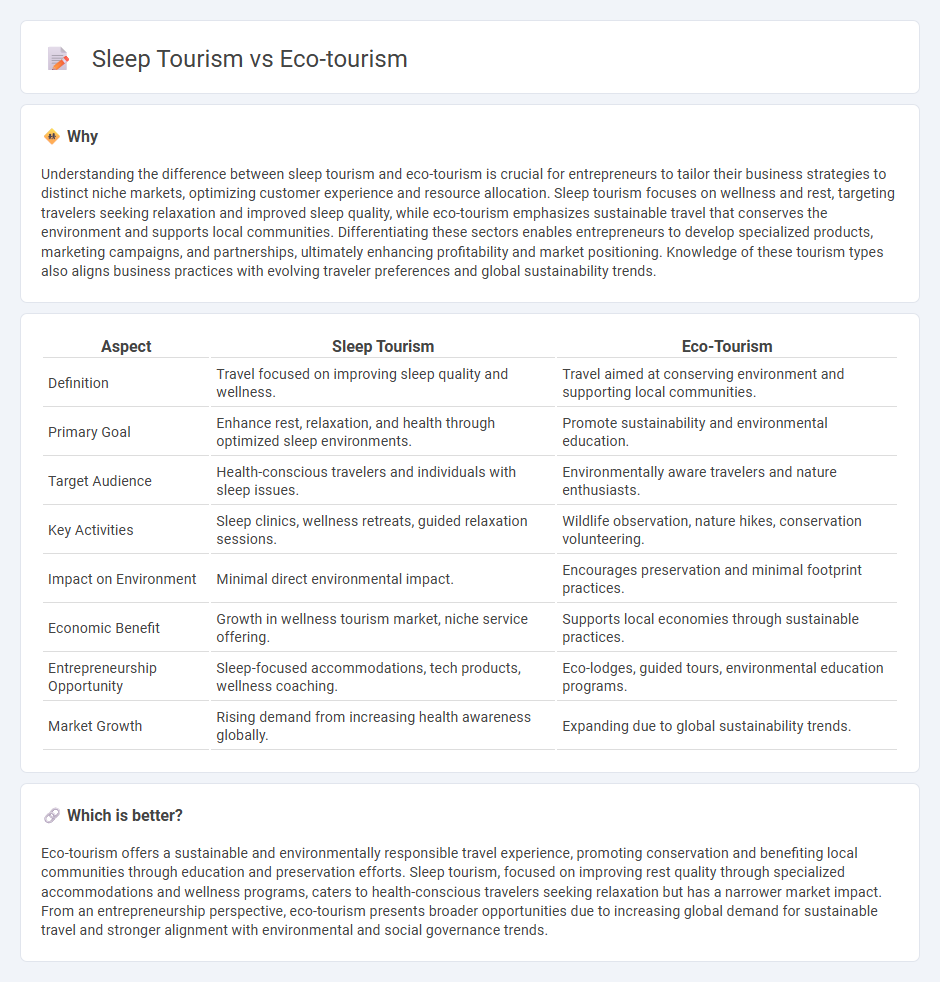
Sleep tourism focuses on travelers seeking rest and relaxation in serene environments to improve well-being, often emphasizing high-quality accommodations and wellness services. Eco-tourism prioritizes sustainable travel practices that protect natural habitats and promote environmental awareness while supporting local communities. Discover how entrepreneurial ventures capitalize on these growing market trends to create unique, profitable experiences.
Why it is important
Understanding the difference between sleep tourism and eco-tourism is crucial for entrepreneurs to tailor their business strategies to distinct niche markets, optimizing customer experience and resource allocation. Sleep tourism focuses on wellness and rest, targeting travelers seeking relaxation and improved sleep quality, while eco-tourism emphasizes sustainable travel that conserves the environment and supports local communities. Differentiating these sectors enables entrepreneurs to develop specialized products, marketing campaigns, and partnerships, ultimately enhancing profitability and market positioning. Knowledge of these tourism types also aligns business practices with evolving traveler preferences and global sustainability trends.
Comparison Table
| Aspect | Sleep Tourism | Eco-Tourism |
|---|---|---|
| Definition | Travel focused on improving sleep quality and wellness. | Travel aimed at conserving environment and supporting local communities. |
| Primary Goal | Enhance rest, relaxation, and health through optimized sleep environments. | Promote sustainability and environmental education. |
| Target Audience | Health-conscious travelers and individuals with sleep issues. | Environmentally aware travelers and nature enthusiasts. |
| Key Activities | Sleep clinics, wellness retreats, guided relaxation sessions. | Wildlife observation, nature hikes, conservation volunteering. |
| Impact on Environment | Minimal direct environmental impact. | Encourages preservation and minimal footprint practices. |
| Economic Benefit | Growth in wellness tourism market, niche service offering. | Supports local economies through sustainable practices. |
| Entrepreneurship Opportunity | Sleep-focused accommodations, tech products, wellness coaching. | Eco-lodges, guided tours, environmental education programs. |
| Market Growth | Rising demand from increasing health awareness globally. | Expanding due to global sustainability trends. |
Which is better?
Eco-tourism offers a sustainable and environmentally responsible travel experience, promoting conservation and benefiting local communities through education and preservation efforts. Sleep tourism, focused on improving rest quality through specialized accommodations and wellness programs, caters to health-conscious travelers seeking relaxation but has a narrower market impact. From an entrepreneurship perspective, eco-tourism presents broader opportunities due to increasing global demand for sustainable travel and stronger alignment with environmental and social governance trends.
Connection
Sleep tourism and eco-tourism converge through their shared emphasis on health, sustainability, and natural environments that enhance well-being. Entrepreneurs in these sectors design experiences that promote restful sleep amid organic landscapes, leveraging eco-friendly accommodations and activities that reduce environmental impact. This synergy creates unique market opportunities targeting wellness-focused travelers seeking both restorative rest and ecological responsibility.
Key Terms
Eco-tourism:
Eco-tourism emphasizes responsible travel to natural areas that conserves the environment and improves the well-being of local people, promoting biodiversity and sustainable practices. It often involves activities like wildlife watching, organic farming tours, and cultural heritage experiences, aiming to generate awareness and appreciation for ecological and cultural preservation. Discover how eco-tourism fosters meaningful connections with nature and supports conservation efforts globally.
Sustainability
Eco-tourism emphasizes sustainable travel practices that minimize environmental impact and support conservation efforts, often involving activities like wildlife observation, habitat preservation, and community engagement. Sleep tourism prioritizes accommodations designed to enhance rest and wellness, incorporating eco-friendly building materials, energy-efficient systems, and practices aimed at reducing noise and light pollution to promote health sustainability. Discover how these distinct tourism models contribute to sustainability and impact global travel trends.
Conservation
Eco-tourism emphasizes conservation by promoting responsible travel to natural areas that conserves the environment and improves the well-being of local communities. Sleep tourism, focused on wellness and rest in nature, indirectly supports conservation by encouraging quiet, low-impact stays in ecologically sensitive areas. Explore how these tourism trends uniquely contribute to environmental sustainability and preservation efforts.
Source and External Links
What Is Ecotourism - Ecotourism is responsible travel to natural areas that conserves the environment, supports local community well-being, and offers educational interpretation to promote conservation and cultural respect.
Ecotourism - Ecotourism is nature-oriented tourism aimed at conserving the environment, minimizing impact, providing environmental education, and often benefiting host communities financially.
Ecotourism and Sustainable Tourism | GSTC - Ecotourism is sustainable, low-impact tourism focused on learning about nature in natural areas, generating economic benefits for local communities, and enhancing environmental and cultural awareness.
 dowidth.com
dowidth.com